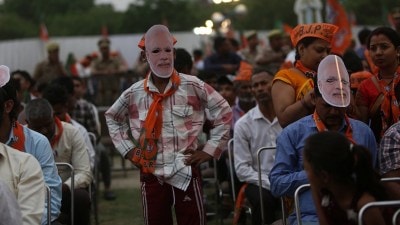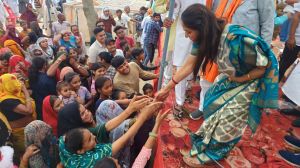- India
- International
Maharashtra: Beed child marriages back in focus during pandemic, activists fear trafficking of girls
Child marriages have been common in Beed district and other rural parts of Maharashtra and, over the years, several measures have been taken to do away with this practice.
 The total effect of the Covid-19 pandemic is therefore projected to result in 13 million additional child marriages, UNFPA Executive Director Dr Natalia Kanem said during the launch of the report. (Representational)
The total effect of the Covid-19 pandemic is therefore projected to result in 13 million additional child marriages, UNFPA Executive Director Dr Natalia Kanem said during the launch of the report. (Representational)
At 14, Sonali Bade from Loni village in Shirur-Kasar taluka of Maharashtra’s drought-prone Beed district was starved, beaten and forced to work long hours at farms, simply because she dared to rebel against the age-old tradition of child marriage. Today, Sonali, now 20, has completed a course in nursing and works as a doctor’s assistant in Pune.
Sonali managed to chart her own future, but not everyone gets that chance. Meenal, (name changed), a 13-year-old from Pimpla village in Beed, did not even get a second chance at life. A week ago, she was strangled to death by her own father, a poor sugarcane farm labourer, who was unwilling to let her come back home after she was married off last year. He has been arrested and charged with murder.
Child marriages have been common in Beed district and other rural parts of Maharashtra and, over the years, several measures have been taken to do away with this practice. However, there is scant data on how the ongoing coronavirus pandemic has affected this harmful practice.
“Till June this year, two cases have been registered under the Prohibition of Child Marriage Act 2006,” Beed District Superintendent of Police Harsh Poddar told The Indian Express. Poddar said police have taken steps to activate ‘village intelligence’, including the sarpanch and local police patils, and intervened in seven such cases.
Beed District collector Rahul Rekhavar said the situation can’t be neglected and the administration has started getting reports of child marriages performed “secretly”.

A major reason behind the high number of child marriages is the fact that of the district’s total population of over 30 lakh, at least five lakh are farm labourers who migrate to work as sugarcane cutters to districts across western Maharashtra and northern Karnataka. Poddar said while families take their sons along for the farm work, minor girls are left behind with older members of the family. “During this time, we also see a spike in cases of molestation, mainly by family members,” said Poddar. To avoid such situations, the families prefer to marry off their young girls.
Kailas Tupe, a Zilla Parishad primary school teacher in Shirur-Kasar taluka of Beed district who has helped the Lek Ladki Abhiyaan stop local child marriages, said, “Even during the lockdown, a few villages in Beed got their young daughters married secretly”.
“In some cases, the wedding was performed with just 10 people gathered together at the ceremony at somebody’s house,” said an anganwadi worker in Shirur Kasar, on condition of anonymity.
Varsha Deshpande, an advocate with the National Commission for Women who embarked upon the Abhiyaan campaign a couple of years ago, said tackling cases of child marriage in the Marathwada region (Aurangabad, Beed, Jalna, Hingoli, Nanded, Osmanabad and Parbhani districts) has been a major challenge as most weddings take place due to socio-economic causes.
“Migration happens around November, when entire families leave and return only by March. Despite being illegal, there are many child marriages due to the poor economic conditions here in Marathwada region, as against other districts in western Maharashtra,” said Deshpande, whose team has been able to stop as many as 173 child marriages in the last few years.
Worldwide, the prevalence of child marriage is around 21 per cent. According to the National Family Health Survey data 2015-16, approximately one in four girls marry before the age of 18 in India. NFHS 2015-16 data for Beed shows that at least 51 per cent women aged between 20 and 24 were married before they turned 18.
“There has been increasing awareness about the issue, but the economic crisis needs to be dealt with foremost. Even if the Prohibition of Child Marriage Act 2006 is implemented stringently, the main reasons why these child marriages take place has not been addressed. Farm labourers’ earnings have come down and this livelihood crisis due to the pandemic is even likely to lead to trafficking of young girls,” said Deshpande, who has trained 500 local girls to enroll for short courses like driving, and learn vocational skills.
The recently-released UNFPA’s State of the World Population Report 2020 has also indicated that a one-year average delay in interventions to end this practice may lead to an estimated 7.4 million more child marriages worldwide. In addition, the pandemic-caused economic downturn is projected to result in an estimated 5.6 million additional child marriages taking place between 2020 and 2030.
The total effect of the Covid-19 pandemic is therefore projected to result in 13 million additional child marriages, UNFPA Executive Director Dr Natalia Kanem said during the launch of the report.
Click here to join Express Pune WhatsApp channel and get a curated list of our stories
Apr 25: Latest News
- 01
- 02
- 03
- 04
- 05







































